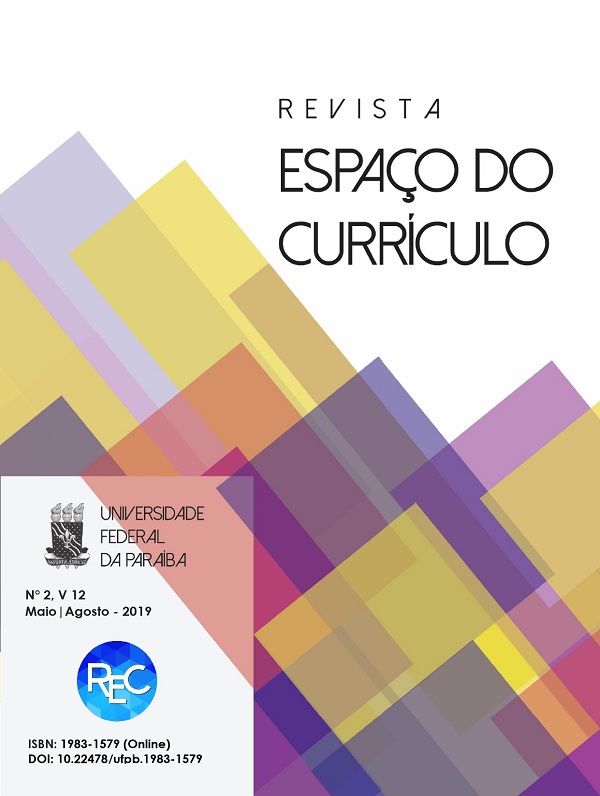PRACTICED CURRICULUMS THINKING ABOUT EJA DAILY LIVES
translation conditions and procedures
DOI:
https://doi.org/10.22478/ufpb.1983-1579.2019v12n2.38641Keywords:
Currículum practiceoftheenvisioned., Young and adult education., Routines.Abstract
What happens in the school routines, in the teachers and students relation, the way they construct knowledge, affectiveness and how they interact in spaces-places in the daily use, it is always larger than possible that what is vertically established in the curriculum prescribed. To comprehend how are the practicesoftheenvisionedin this different curriculum in the daily education of Young and Adults education, and elderlies, and how the practioners of this educative modality resist the logic monocultural of knowledge and re-start knowledges, creating operational learning tatics, it comprehends objectives of this work. The comprehension of this reality preset-possible, it links itself tothe studies about the complex thinking, of the research nosdoscomthe daily the reflections about the sociology of the absences and emergencies. Thus, a deep dive in the daily routine of the teachers in this educative modality has characterized itself as indispensable methodological procedure so that it Will be possible to know, since inside, how these teachers have faced the established conditions by reality of the curricular hegemonic knowledge and what translation procedures have been produced in the interactions which maintain with a group. The linkage in the different curriculum practices has reaveld evidences of fight, of resistence and creativity, specific educative processes democratizing, contributing with the debate in the nowadays context of educational political reform, and in the way how knowledge produced in the EJAdo not come from the premise of a general knowledge, neither general ignorance.
Downloads
Metrics
References
AFONSO, Augusto. O papel do professor na (Re)Construção do Currículo do 1º Ciclo do Ensino Secundário em Angola: das intenções às práticas. Capítulo III da Tese de Doutoramento. Braga: Instituto de Educação e Psicologia da Universidade do Minho, 2004.
ANGOLA - Lei de Bases do Sistema Educativo Angoano. Lei de Base do Sistema de Educação e Ensino Nº 17/16 de 7 de Outubro. Angola, 2016.
CANÁRIO, Rui. A escola tem futuro? Das promessas às incertezas. Porto Alegre: Artmed, 2006.
COUTINHO, Carlos. Paradigmas, Metodologias e Métodos de Investigação. Lisboa: Almedina, 2011.
DLP. Dicionário da Língua Portuguesa. Porto: Porto Editora, 2011.
FIGUEIREDO, Carla; LEITE, Carlinda & FERNANDES, Preciosa. O desenvolvimento do currículo no contexto de uma avaliação de escolas centrada nos resultados: que implicações? Currículo sem Fronteiras, v. 16, n. 3, p. 646-664, set./dez. 2016.
GIL, António. Métodos e Técnicas de Pesquisa Social. 6ª Edição. São Paulo: Atlas , 2008.
LEITE, Carlinda. Para uma escola Curricularmente inteligente. Porto: Edições Asa, 2003.
MARCONI, Andrade; LAKATOS, Eva. Fundamentos de Metodologia Científica. 5ª ed. São Paulo: Editora Atlas S.A, 2003.
MORGADO, José . A (des)construção da autonomia curricular. Lisboa: Edições ASA, 2000.
MACHADO, Manuel. O Papel do Professor na Construção do Currículo. Dissertação apresentada para obtenção do grau de Mestre em Ciências da Educação. Braga: Instituto de Educação e Psicologia da Universidade do Minho, 2006.
PACHECO, José. Currículo: teoria e práxis. Porto: Porto Editora, 2001.
PACHECO, José. Tendências de descentralização das políticas curriculares. In José Augusto Pacheco (Org.), Políticas Educativas. O Neoliberalismo em Educação. Porto: Porto Editora, pp. 91-107, 2001.
Downloads
Published
How to Cite
Issue
Section
License
By submitting an article to Curriculum Space Journal (CSJ) and having it approved, the authors agree to assign, without remuneration, the following rights to Curriculum Space Journal: first publication rights and permission for CSJ to redistribute this article. article and its metadata to the indexing and reference services that its editors deem appropriate.
















